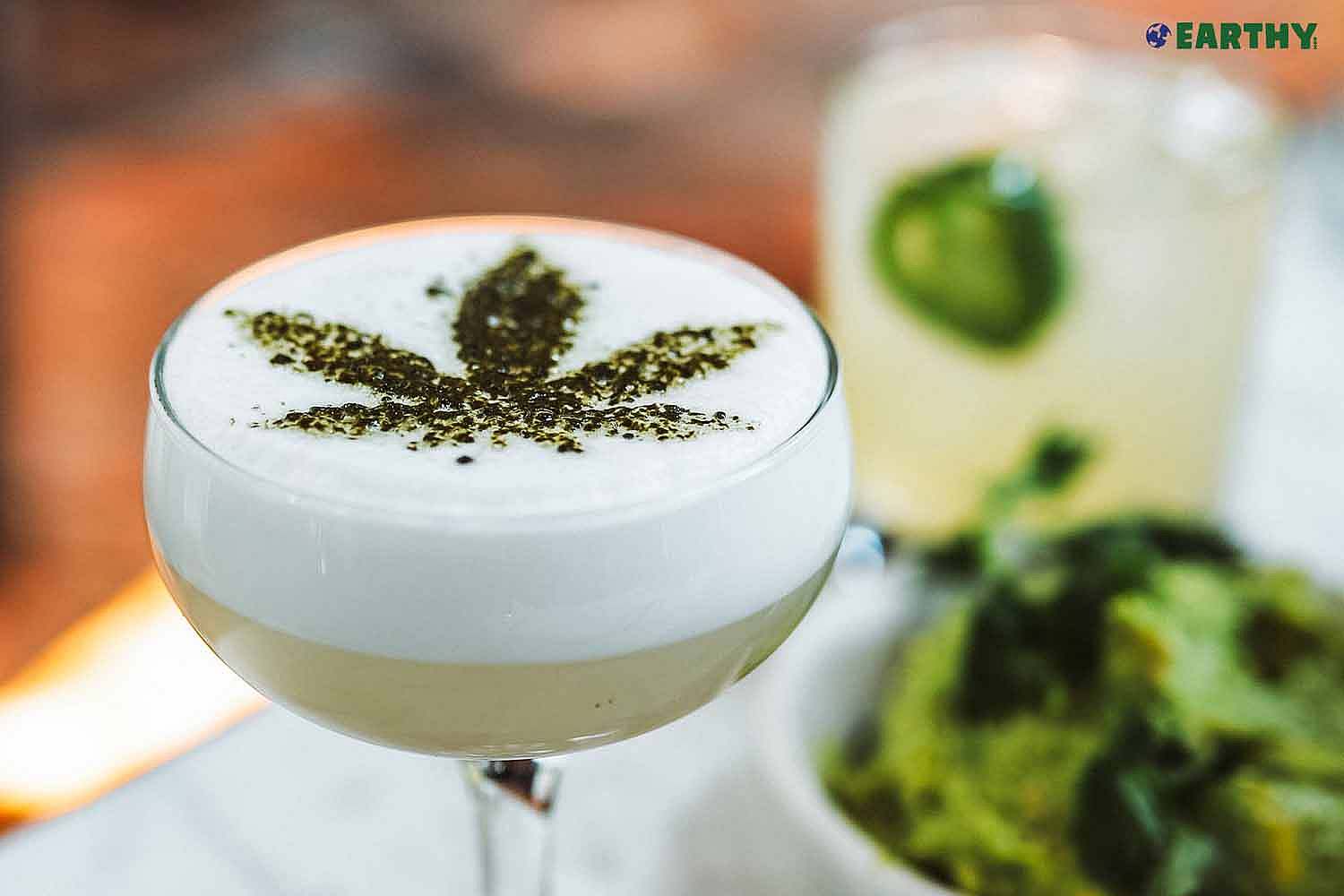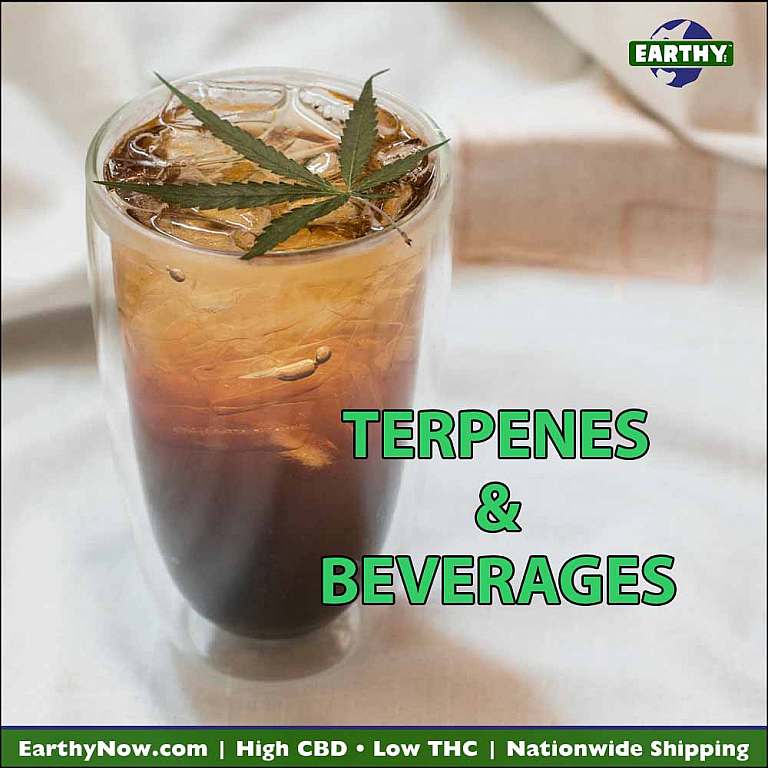Do cannabis terpenes and beverages go together? We modern humans love to hover our noses over a fragrant beverage like wine or a gin gimlet, breathing in the scents and savoring the bouquet. But, what are we smelling, exactly? It turns out that many of these smells are the aromatic molecules called terpenes.
Cannabis edibles have been around for quite a while. Now, we can enjoy cannabis drinkables—beverages infused with cannabis compounds, including terpenes. With the ever-rising trend of cannabis products, the sky appears to be the limit when it comes to terpene infusions, whether they’re added to food, pharmaceuticals, topicals, or beverages.
Determined not to miss out on the latest cannabis trends, food and beverage companies have been quick to hop on the terpene train. Likewise, adventurous mixologists across the country stir up exciting new cocktails to serve their customers as more bar and restaurant patrons discover the joys of these novel drinks. Before long, we’ll likely be seeing more bottles of specially designed terpenes sitting alongside bitters, simple syrup, tonic, and alcohol as bartenders surprise customers and tantalize tastebuds with cannabis beverages.
How well do you know your terpenes?
From the pungent scent of a muddled mint leaf in a mojito to the burst of the sour aroma rising from a squeezed lemon, terpenes inhabit many of the plants involved in our daily activities and rituals. Without question, terpenes make our lives richer and more pleasurable. Thanks to them, we can experience countless different flavors in foods and beverages as well as experience the aromatherapy of a vast array of flowers and essential oils. But, what exactly are they?
At their core, terpenes are molecules responsible for protecting a plant. They serve the plant in this way by giving off scents that protect it from predators, as well as helping the plant attract pollinators. A particularly repellent smell, for instance, might help the plant stay out of the path of an animal who wishes to eat it. On the other hand, terpenes play a vital role in luring helpful insects to flowers to ensure the plant’s survival through pollination. Some of the most prominent terpenes in cannabis include alpha-pinene, beta-pinene, limonene, and myrcene.
Cannabis terpenes vs. botanical terpenes
Though all the terpenes in cannabis are technically botanically-derived, as cannabis is a plant, the cannabis industry has come to differentiate between cannabis-derived terpenes and botanical-derived (non-cannabis-derived) terpenes. Cannabis terpenes and botanical terpenes share many of the same terpenes. For example, linalool, a terpene in cannabis strains such as Suver Haze and Sour Special, is also in lavender, giving them similar scents.
Learn more about the top 20 cannabis derived terpenes.
What are the health benefits of terpenes?
While we are far from fully understanding all the benefits of terpenes, the minimal research thus far conducted has led to encouraging theories about how terpenes may potentially help us. For instance, the terpene eucalyptol, which is abundant in eucalyptus as well as some cannabis strains, is often added to cough and cold medicine.
When it comes to cannabis terpenes, there is some evidence to indicate that they play a powerful role in the endocannabinoid system (ECS) by influencing the entourage effect [3]. The entourage effect was first coined by Mechoulam and Ben-Shabat in their 1998 hypothesis that proposed that other organic compounds work in tandem with the primary endogenous cannabinoids in cannabis, thereby enhancing their effects. This may indicate that terpenes taken with other cannabis compounds may affect the body differently than terpene isolates or cannabis products that are not full-spectrum.
An example of how terpenes may contribute to the entourage effect can be found in a study published recently in Science Daily. The study proposes that terpenes interact with other compounds in cannabis to uniquely affect the body’s cell receptors. The results from this University of Arizona Health Sciences study have inspired additional research for cannabis terpenes [3].
Can you get high on cannabis terpenes?
Arguably, cannabis terpenes work in the same way as essential oils do on your cell receptors. They affect taste and smell as well as contribute to other potential benefits, yet they are not psychoactive in and of themselves. Nonetheless, terpenes seem to affect the way that people experience the THC (psychoactive) or CBD (non-psychoactive) in cannabis.
Benefits of using terpenes in beverages
More brands are beginning to incorporate terpenes into their drinks because of their many benefits. Cannabis terpenes make great ingredients for beverages because:
- They are all-natural
- They work well in both hot and cold beverages
- Cannabis can now be processed in a way that produces water-soluble terpenes
- They do not add extra sugar or calories to beverages
- People love the taste of cannabis
- They are cost-efficient while offering exciting flavors
- They work well with spirits
- Multiple terpenes can be added to beverages for more complex flavors and designer terpene blends
- They can enhance drinks
What do terpenes taste like?
The variety of terpene scents and flavors in nature is practically infinite. In fact, any word that could describe the flavor of a fruit, vegetable, flower, or tree would be an apt way to describe what terpenes might taste or smell like. For instance, limonene is sometimes described as tasting citrusy, while linalool might be described as more floral. Pinene is often described as piney or earthy. Cannabis and fruits with beta-caryophyllene have been described as peppery or cinnamon-like. Much like a sommelier describing a wine, cannabis enthusiasts enjoy imaginative descriptions of their favorite terpene-infused products.
Drinks with terpenes
What is a cannabis beverage? Even the name is bound to get people’s attention. But, the taste of a terpene-infused drink will no doubt seal the deal for many cannabis lovers. For example, limonene and linalool can be added to juice to make drinks such as an edgy version of lavender lemonade. Or, the terpene extract of a cannabis strain like Cherry Soda could be added to a cocktail as an alternative to mixers such as herbal or orange bitters. Indeed, everyone who enjoys the smells and tastes of cannabis products is likely to find their perfect terpene-infused liquid refreshment, whether it’s a sports drink, cocktail, beer, tea, or soda.
Cannabis terpenes also make great “mocktails” because of their complex natural flavors. For instance, to achieve a piney flavor, you could add pinene to club soda or tonic. Or, if you want to make a sweet, cinnamony-flavored drink, beta-caryophyllene might be the best terpene to add. Enhance your terpene-infused mocktail with a splash of fruit juice for more vitamins, minerals, and nutrients.
Are terpenes safe to use in beverages?
When the terpene extraction process is conducted properly, terpenes are safe to use in beverages, as long as they are sufficiently diluted. In diluted form (5% or less), terpenes are non-toxic [4].
The two main methods for terpene extraction are solventless and solvent-based extraction. Solventless extraction typically uses steam distillation or hydrodistillation, both of which use heat and water in the process. Solvent-based extraction is done at lower temperatures with hydrocarbons, gasses, and vacuums [5].
In order to preserve the pure aromas and flavors of terpenes, either process must be conducted carefully. Too much heat or pressure can lead to the breakdown of the terpene chemical structure, and improper solvent processing can leave unwanted substances. Thus, it’s important to buy high-quality terpenes from reputable companies like Earthy—products that are 100% cannabis-derived, all-natural, and strain-specific, with no additives.
Earthy uses organically grown, morning-harvested cannabis right from the field—never dried or frozen—for the freshest possible terpenes. Earthy’s solventless extraction and testing process maximizes potency and ensures purity and safety.
Alpha-Humulene: The Beer and Cannabis Connection
Terpenes in alcohol
Alcoholic beverages lend themselves well to terpene infusions. For instance, wines, beers, and many spirits contain their own natural botanical terpenes that may be enhanced with cannabis terpenes. Rose, citrus, pine, and mint are some of the common aromas associated with wine-tasting. By adding cannabis terpenes to wine, a whole set of new associations may be evoked, increasing the olfactory diversity of the wine.
In addition to wine, spirits such as tequila have plenty of natural terpenes found in the agave cactus from which it is made. What if cannabis terpenes were added to tequila, vodka, gin, or whisky? New trends involving these creative combinations are popping up every day [6].
Terpenes in beer
Recognizing the enormous potential of the terpene-infused beer niche market, many craft breweries have begun adding cannabis terpenes to their beverages as eager customers get in line for a taste. Craft beer pioneer Lagunitas Brewing Company, for example, was excited to participate in this trend, and in 2017 they launched Supercritical; a beer made with cannabis terpenes [7]. Likewise, New Belgium Brewing created The Hemperor beer that brewer Mark Koenigs describes as “dank, grassy, woody, spicy and green [8].”
Mixed drinks & beyond
There may have never been a more exciting time to be a mixologist. With restaurants and bars clamoring for the most sensational cocktail in town, cannabis-derived terpenes are poised to become the next coveted mixed drink ingredient.
A cocktail with a few drops of limonene, for instance, adds a pleasing citrus flavor and aroma. Myrcene will add an earthy, fruity scent with hints of mango and mint. Or, to add a spicy, clovey, or peppery quality to a cocktail, caryophyllene may be used.
Limonene may be the most common terpene currently used in mixed drinks. Cocktails that contain gin and orange bitters can benefit from limonene terpenes to reduce the bitterness of the orange. Likewise, the popular kombucha drinks often use limonene, as it counteracts the sharp flavor of the fermented tea [9].
Are terpenes legal to use in beverages?
If a company or individual uses cannabis terpenes extracted from federally compliant hemp in their beverages, they are acting in accordance with the law. The 2014 Farm Bill and 2018 Farm Bills allow people to research, produce, transport, sell, and consume hemp-derived products with less than .3% Delta-9 THC, making clear that these products, including terpenes, are federally-compliant [10].
On the other hand, marijuana—defined as cannabis containing more than .3% Delta-9 THC—is still not federally legal, and products derived from them are not federally compliant. Many states have changed their laws to sanction medical and/or adult recreational of marijuana. However, the country as a whole has not caught up. Thanks to the Farm Bills, we all can enjoy the benefits of cannabis-derived terpenes and other goods produced from federally compliant hemp, a most famous example being cannabidiol, or CBD.
Final thoughts on terpenes and beverages
We all have a go-to beverage. For some, iced tea or coffee best quenches the thirst. Others fuel up with a sports drink before a workout or unwind with a beer after work. Sparkling water hits the spot any time of day for still others. If you’re in the beverage market though, you want to make sure people are reaching for your beverages on the shelves. Cannabis terpenes in beverages just might be the new magic that keep thirsty customers coming back for more.
How to Make Cannabis-Infused Beverages at Home
Disclaimer – Information is provided for educational purposes. It does not, and is not intended to, constitute legal advice or medical advice. We attempt to be accurate and up to date but the legality of cannabinoids and the science of cannabis is evolving. The author is neither a lawyer or a legal expert, nor a doctor or medical expert. You should check with your local authorities and medical providers before buying or using any products.
References
- Everything You Need to Know About A-Phellandrene and its Benefits
- Web MD: Health Benefits of Limonene
- Studies Show Terpenes can Provide Pain Relief
- Are Terpenes Safe?
- How Are Terpenes Extracted?
- Terpenes and Tequila
- Terpenes and Craft Beer
- Beer Scout Hemp Grows More Popular on Local and National Level
- Terpene Infused Beverages: What are they and how to make them
- The Farm Bill – Hemp and the CBD Explainer






